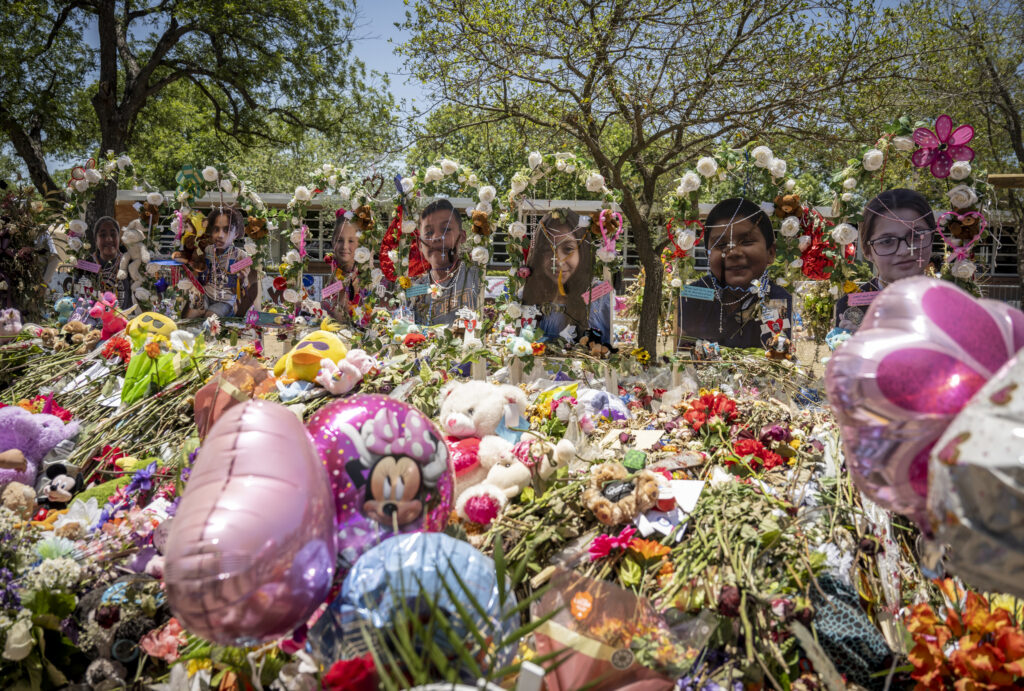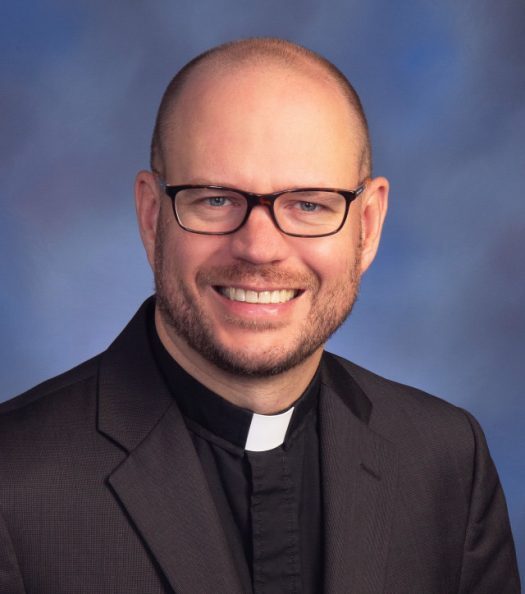Co-missioners,
Today is the Feast of our Lord’s Ascension. It’s also the Thursday before the Seventh Sunday of Easter. Easter 7 is the church’s date for a sermon we share with you today. It was preached in 2022 at Grace Lutheran Church in River Forest, Illinois, a second-ring suburb due west of downtown Chicago.
Grace was established at the beginning of the 1900’s as an LCMS congregation. It also abuts the Missouri Synod’s Concordia University, Chicago, which for most of its history was primarily a teachers’ college. Hence the enduring parochial school ministry at Grace that you’ll hear about in the sermon. In the tumult of the late 1970’s the congregation left the LCMS without joining another Lutheran group. To this day it remains officially unaffiliated.
The preacher last year was the Rev. David R. Lyle, Grace’s current Senior Pastor. Earlier that week an eighteen-year-old gunman had slaughtered nineteen students and two teachers at an elementary school in Uvalde, Texas. Pr. Lyle addressed this head on. In the months since, there has been no let-up in the mass shootings that plague America, and American schools in particular. All the more reason why Pr. Lyle’s Easter counsel to the saints of Grace bears a fresh and wider hearing in 2023.
Peace and Joy,
The Crossings Community
________________________________________________________________
“Unity after Uvalde?” A Year-Old Sermon on John 17:20-26
by David R. Lyle
Alleluia! Christ is risen! He is risen, indeed! Alleluia!
As summer approaches, the rituals of the season are unfolding. At Grace, this means we are marking the end of the school year in a variety of ways. One of my favorite traditions at Grace is that the penultimate chapel service of the year is led by our graduating eighth graders. This year’s class of eighteen students is remarkable in many ways (they are Grace students, after all), and they did a wonderful job. One of the songs they chose for the service was “Fear Not for Tomorrow.” It’s a lovely, hopeful song about entrusting ourselves to God’s care. I was singing along from the back pew when a sudden urge came over me. I slipped out of the sanctuary and gently pushed against each of the wooden doors in the narthex. In spite of the words we were singing, I couldn’t help checking to make sure the doors were locked.
They were, of course. They always are during the school day. But I had to be sure. Singing about tomorrow, I was thinking about yesterday, for the day before nineteen children and two teachers had been killed at Robb Elementary School in Uvalde, Texas. When I first heard the news on Tuesday, I was sad, angry, and afraid for those in danger. But I wasn’t surprised. Not in America, not these days. Not in the wake of so many other school shootings; not in the wake of what unfolded at a grocery store in Buffalo two weeks ago. Twenty-one more lives offered upon this nation’s altar of violence and guns, of our indifference to suffering.
Years ago, we hoped that such acts of violence would draw us together, unite us. Sadly, we know that’s not true. Sadly, such things will almost certainly happen again, thoughts and prayers notwithstanding.
+ + +
On the night before his own death, another innocent victim offered up to this world’s insatiable thirst for violence and death, Jesus has a few thoughts and prayers of his own.
Staring his own death in the face, he thinks not of what is about to happen to him, but of what will happen to us. He prays not for himself; he prays for us. He prays that we will be one, united with him and with one another, as he is united with his Father. He prays that the love of God would take root in us, and that we would share this love with one another and with all this rebellious world.
In the face of so much division, so much violence, this is the prayer we need. While I as your pastor would never encourage you to pray less, to stop praying for an end to violence, for evil to stop, for hearts and minds to change, for God’s peace to prevail—still, perhaps Jesus’ prayer is a reminder to us. Perhaps we should spend less time praying for God to do something and more time remembering that Jesus is praying for us, that we would do something. Until Jesus returns in glory, we are his hands and feet in this world. We can only do so by God’s power, to be sure, but it is up to us to effect change in this world. Guns are idols of our creation. Change is up to us. We are called to repent, to return in worship to the one true God; the Triune God who is a God of peace, not violence; hope, not fear; life, not death.
We are, of course, too mired in sin to begin, let alone complete, this work on our own. But we are not on our own. We have been crucified with Christ and live now in the promise and power of the resurrection. We fear not for tomorrow because in baptism we already died many yesterdays ago. The unity for which we yearn is not something we must create or cobble together; it is gifted to us by Christ as the Sprit knits us into Christ’s body. The love of God is not like our fickle, feeble love; it is given as a gift, poured out from the cross of Christ. Meda Stamper writes, “The oneness of the Father and Jesus is synonymous with love in John, and what the world is to see in our display of that oneness is the love of God miraculously made manifest. Our love for God and one another becomes then an offering in and for the world to experience the love through which all creation has come into being.” [1]
So, the question, it seems to be, is at which altar we will make our offerings. Will we continue to worship at the altar of violence and death, giving no more than lip service to God? Or will we make our lives offerings of thanks and praise to the God of life by working for life in God’s name? Try as we might, we cannot worship two gods at once. As we mourn the deaths of twenty-one children of God in Uvalde, it seems to me that the time has come to make a choice. I offer no policy suggestions and I’m not here as a partisan. Just a preacher with a word: If we continue to live by the gun, we will die by the gun. Or we can live by faith and claim the life that is really life.
+ + +
I spent yesterday, a beautiful Saturday, with thirteen fourth graders. It was the first day of the first tournament for my son’s summer baseball team. As they were warming up before their first game, their chatter was all about the games they had played against each other; about how this umpire had blown that call; about how that team should have won instead of this team. They had only been opponents before yesterday. By the time the game started, however, matters had shifted. After the call to “play ball,” they settled into oneness, united in purpose. They worked together easily, encouraging one another, lifting each other up. By the end of the day, it was hard to imagine that anything had ever separated them. It’s amazing that what comes so easily to children is so difficult for adults.

A memorial site commemorating the victims of the Robb Elementary School shooting – DHS (U.S. Department of Homeland Security) Photo by Benjamin Applebaum, via Wikimedia Commons From https://commons.wikimedia.org/
Today, I invite you to consider fourth graders. The fourth graders of Robb Elementary cry out to us. It is not enough to say that we, as a nation, failed them, although that is certainly true. As I saw on social media this week, there’s no such thing as other people’s children. These children were ours, and we allowed them to be sacrificed to a nation, a world, that demands innocent blood—a world that will do so again. Consider, too, the fourth graders on my son’s team who remind us that working together is actually pretty easy to do. All we need to do is agree on the goal. Is working to minimize, if not end, gun violence something we really want to disagree about? For freedom Christ has set us free. Cast down the idols. Guns may not be our only problem, but that’s no excuse to not do anything about how easily we make them available, how greatly we glorify them, how deeply so many worship them. It is time to repent.
This morning, amid everything else, we catch a glimpse of a vision of hope. In the blood of Christ the Lamb, we have been washed and will be welcomed into the city of God. All who hear are welcome; come! All who suffer are welcome; come! All who thirst for justice and peace are welcome, for there, justice and peace will be found. One day, Christ will return, overthrowing once and for all this world’s opposition to God’s reign. By his grace we will finally come to our senses, melting down handguns to make garden hoes and beating assault rifles into ploughshares, that together we may till the soil around the tree of life. For Christ the victim is also Christ the victor, and his promises are certain and sure. His triumph is won, and his Kingdom will come. It’s coming, some tomorrow or another. Maybe yet today. We know not when, but it’s coming. So yes, fear not for tomorrow, for tomorrow is in God’s hands. But work for today, for God has placed so much that matters today in our hands.
But we are not alone. We are knit together. Jesus is with us. Jesus prays for us. And for Jesus’ sake, the status quo can be good enough no longer. For Christ’s sake and in anticipation of his reign, let us love. Let us do better. Amen.
Alleluia! Christ is risen! He is risen, indeed! Alleluia!
_______
Endnote—
[1] https://www.workingpreacher.org/commentaries/revised-common-lectionary/seventh-sunday-of-easter-3/commentary-on-john-1720-26-5
Thursday Theology: that the benefits of Christ be put to use
A publication of the Crossings Community





You must be logged in to post a comment.